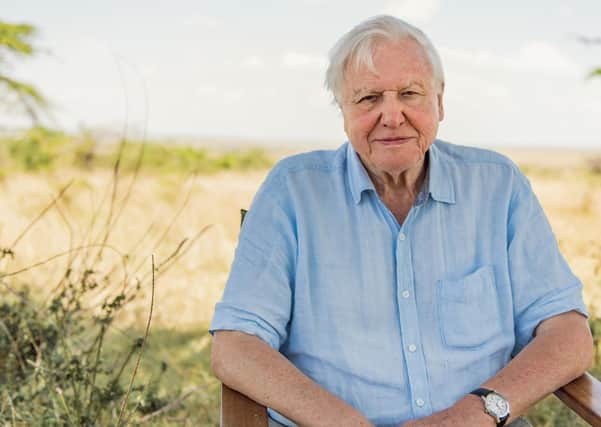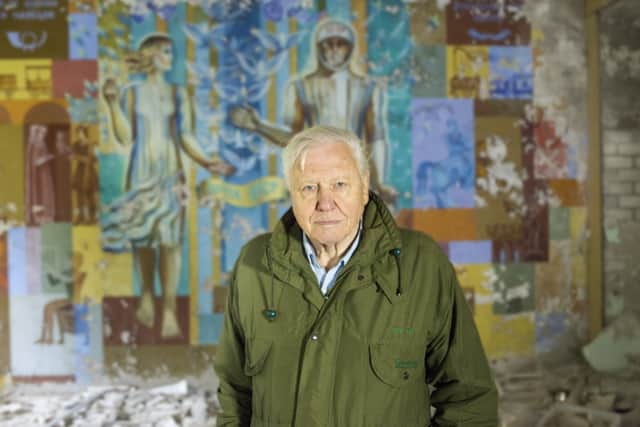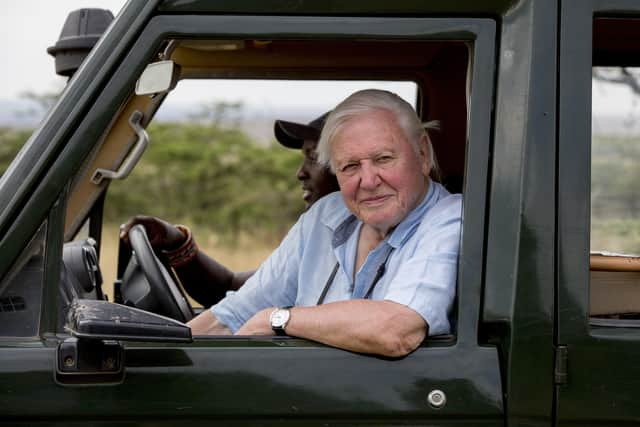David Attenborough: “Humanity is at a crossroads - the natural world is under serious threat”


If there’s anyone who can make the world sit up and listen, it’s Sir David Attenborough.
The 94-year-old naturalist and broadcaster, who was born in west London, describes the life he has had as “extraordinary” and “fortunate”.
Advertisement
Hide AdAdvertisement
Hide AdIt’s one that has seen him visit every continent on the globe, and make some of the most impactful TV series in our history, including Planet Earth and Blue Planet for the BBC.


And now comes a new film, David Attenborough: A Life On Our Planet – which serves as his witness statement for the natural world.
“I think we are at a crucial moment,” he urges. “Without being too portentous on this, I think humanity is at a crossroads, and the natural world is really under serious, serious threat and the consequences could be apocalyptic.”
It’s early March when I speak to Sir David about the feature, created by award-winning natural history filmmakers Silverback Films and global environmental organisation WWF.
Advertisement
Hide AdAdvertisement
Hide AdAlthough I don’t realise it at the time, he ends up being one of the last interviews I would do face to face, thanks to coronavirus (indeed, that’s also the reason the film’s release was delayed by months).


In a quote sent over by email reflecting on the Covid-19 pandemic, he notes how it has “caused, and will continue to cause, immense suffering”.
“If there is hope that can come out of it then that may arise from the whole world having experienced a shared threat and found a sense that we are all in it together,” follows the father-of-two, whose wife Elizabeth died of a brain haemorrhage in 1997. “The same unique brains and communication skills that fuelled the development of our civilisations now have access to technologies and institutions that allow all nations of the world to collaborate and co-operate should we choose to do so.
“The time for pure national interests has passed. If we are to tackle climate change, enable sustainable development, and restore biodiversity, then internationalism has to be our approach. In doing so, we must bring about a greater equality between what nations take from the world and what they give back. The wealthier nations have taken a lot and the time has now come to give.”
Advertisement
Hide AdAdvertisement
Hide AdIt’s exciting people will finally be able to see A Life On Our Planet, which is premiering in cinemas across the globe, and will later be available on Netflix.
A revealing and powerful first-hand account, it sees Sir David reflect, for the first time, upon both the defining moments of his lifetime as a naturalist and the devastating changes he has witnessed.
Although we are very used to seeing the star on screen, there’s something about Life On Our Planet which feels that bit more intimate.
He suggests he could open up so much, and convey the concern he has, because of a technical trick Silverback used.
Advertisement
Hide AdAdvertisement
Hide AdInstead of talking to a camera, he was being interviewed by the director of the documentary, Johnny Hughes, who appeared on an optical device as an electronic image.
The conversation – which saw Sir David “asked very clever, very perceptive questions, and got me arguing about certain things” – was recorded over several days and then segments of it were used throughout the film.
“It’s quite hard to look at the camera and speak in this kind of way, as we are speaking between ourselves now,” he muses. “To do that to a piece of glass is not easy, but this trick, they were doing it exactly as if I was looking at you, or him, in person.
“And I think when I saw it [the film]… Well, I suppose I was amazed at the image of this character on the screen who was speaking as if he was speaking not to a camera.”
Advertisement
Hide AdAdvertisement
Hide AdOf course, whatever Sir David stars in, he commands attention. His awe-inspiring presence is felt even more so in real life; there’s a buzz of excitement in the air as he sits down at the table with me and other journalists, and we all fall silent.
But he’s not intimidating – far from it. He jovially pokes fun at himself, particularly when he gets some figures slightly wrong (“one of the things I’m hopeless at remembering is whether it’s 100 per cent or 220 per cent or whatever”, he quips).
A Life On Our Planet does actually end on quite a positive note as well, with Sir David saying that there is still time and humans can change things.
So, how does he think we can all play our part?
“The most important thing that we can do at this particular stage in the game is to put in the right politicians into positions of power who will say something about saving the planet, and to be quite vocal, as part of their electorate, that we demand that they actually do something and to convince them that we are prepared to take an increase in tax if necessary, to make sure that something is going to happen.”
Advertisement
Hide AdAdvertisement
Hide AdThe film starts and ends in Chernobyl, Ukraine, and the team also travelled to the Maasai Mara in Kenya.
The elephant in the room is that making such a big documentary like this must rack up quite a large carbon footprint.
But Sir David matter-of-factly defends this issue when it’s pointed out.
“We’re all damaging the environment just by sitting here and breathing,” he suggests. “The amount of carbon dioxide that is going out through the window as a consequence of us meeting here is significant. And do we always say, ‘Now was that really worthwhile, you spending that breath?’
Advertisement
Hide AdAdvertisement
Hide Ad“If you behave economically and sensibly, I don’t think you should feel guilty if it’s cost you some ergs in your engine to get you from A to B.”
Being wasteful is “the real sin”, he adds.
“We are astonishingly wasteful. I remember my dear father-in-law coming back in the middle of the war from America, and was appalled that he had actually seen an American at a meal stubbing his cigarette out on a half-eaten steak, because of the waste.
“We put a light on in a room when we don’t need it – but that doesn’t mean you shouldn’t put it on when you do need it.
“But it’s just being profligate and careless and immoral… Waste is immoral; the wasting of power, the wasting of paper, the wasting of energy.
Advertisement
Hide AdAdvertisement
Hide Ad“We shouldn’t waste space; we are wasting space that could be occupied by the natural world.”
Film’s timing ‘is deeply significant’
Executive producer Colin Butfield says Sir David’s latest film is one of his most important – and timely.
“For decades, David has brought the natural world to the homes of audiences worldwide, but there has never been a more significant moment for him to share his own story and reflections. This film coincides with a monumental year for environmental action as world leaders make critical decisions on nature and climate. It sends a powerful message from the most inspiring and celebrated naturalist of our time.”
Keith Scholey, executive producer at Silverback Films, adds: “I’ve worked with David on many projects, but to collaborate on this film, which is so important at this time, has been a real privilege.”
Advertisement
Hide AdAdvertisement
Hide AdDavid Attenborough: A Life On Our Planet premieres in cinemas across the globe on Monday, September 28, featuring an exclusive conversation with Sir David Attenborough and Sir Michael Palin. The film will then launch on Netflix globally on Sunday, October 4.
Support The Yorkshire Post and become a subscriber today.
Your subscription will help us to continue to bring quality news to the people of Yorkshire. In return, you’ll see fewer ads on site, get free access to our app and receive exclusive members-only offers.
So, please - if you can - pay for our work. Just £5 per month is the starting point. If you think that which we are trying to achieve is worth more, you can pay us what you think we are worth. By doing so, you will be investing in something that is becoming increasingly rare. Independent journalism that cares less about right and left and more about right and wrong. Journalism you can trust.
Thank you
James Mitchinson
Comment Guidelines
National World encourages reader discussion on our stories. User feedback, insights and back-and-forth exchanges add a rich layer of context to reporting. Please review our Community Guidelines before commenting.